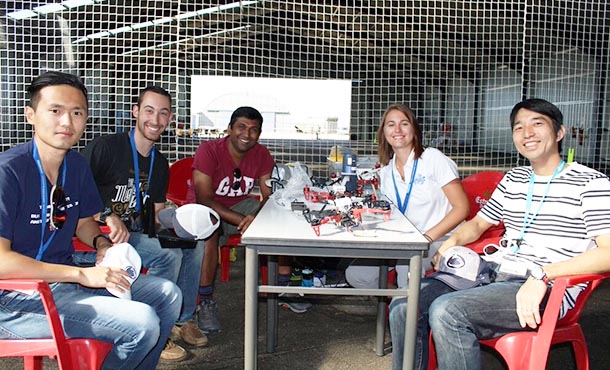
Rachel Axton, second from right, poses with her teammates of the Penn State Autonomous Robotics Competition Club at an indoor flight challenge. IMAGE: AUTONOMOUS ROBOTICS COMPETITION CLUB
Aerospace student receives Zonta International Amelia Earhart Fellowship
7/21/2021
By Mariah Chuprinski
UNIVERSITY PARK, Pa. — Rachel Axten, a fourth-year graduate student in aerospace engineering, recently received the Zonta International Amelia Earhart Fellowship.
Zonta International, a service organization focused on advancing gender equity, annually honors women aerospace engineers pursuing doctoral degrees whose research contributes to the fields of aerospace engineering or space science. This year, Axten was one of 36 women honored around the world, with 10 hailing from the United States.
The $10,000 award will provide living support for Axten, who is finishing up a three-year graduate research fellowship from the National Science Foundation.
Axten researches drone autonomy, from developing vehicles to building new drones to developing drone software and configurations. Another name for a drone is an unmanned aerial vehicle, or UAV.
“My work centers on the reliability and safety of drones, as with obstacle avoidance testing, with the end goal of making them safer,” Axten said. “There is a lot of interest in the corporate world in using drones for package delivery.”
But such companies have problems and limitations in using UAVs for package delivery, due to concerns with weather, emergency landings and weight limits.
“Drones have to be able to see the surrounding area, so real-time cameras are important,” Axten said. “But with rainy or foggy weather, that becomes a challenge. Landings and hardware failures, like a broken wing, can also cause safety problems, such as the hazard of landing on people and things.”
In addition to package delivery, there is interest in using drones for medication and supplies deliveries on large hospital campuses, according to Axten. Eventually, she said, the goal is for the drones to be autonomous, or operating without a pilot. Once programmed effectively, drones can stick to their course without remote control or active monitoring.
Another possible use that is gaining traction is in assisting first responders, who can use drones to search for missing persons, especially in areas where there is limited cell phone service.
“But Tesla is showing the limitations we have now with autonomous, or unmanned, vehicles,” Axten said. “There are good ideas out there, but they have logistical challenges, which is what we work on.”
Axten is part of the PURL lab, which stands for Penn State Unmanned Aircraft System Research Lab, which is headed by her adviser, Eric Johnson, professor of aerospace engineering.
Outside of the classroom, Axten and her colleagues participate in the Autonomous Robotics Competition Club, where graduate and undergraduate students compete against other schools and industry groups on drone challenges and scenarios.
Some of the competitions have cash prizes. The club recently won $30,000 for participating in the National Institute of Standards and Technology’s competition, the First Responder UAS Endurance Challenge, sponsored by the United States Department of Commerce, which focused on drone technology to support first responder missions. The team took third place for longest flight duration, worth $20,000, as well as the first responders’ choice award and an award for drone autonomy, both worth $5,000.




